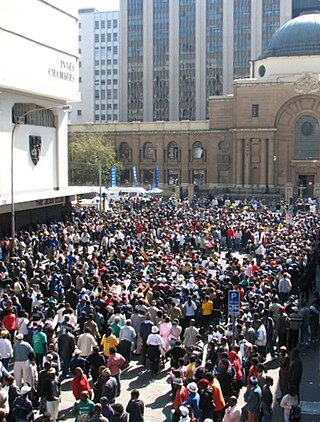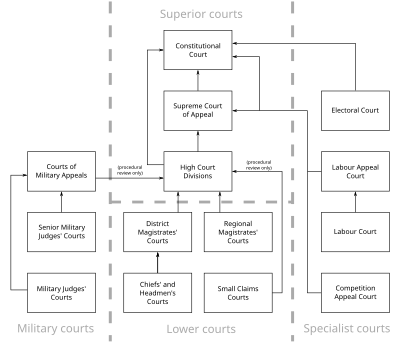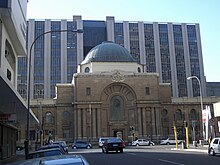The Courts of England and Wales, supported administratively by His Majesty's Courts and Tribunals Service, are the civil and criminal courts responsible for the administration of justice in England and Wales.
In common law systems, a superior court is a court of general jurisdiction over civil and criminal legal cases. A superior court is "superior" in relation to a court with limited jurisdiction, which is restricted to civil cases involving monetary amounts with a specific limit, or criminal cases involving offenses of a less serious nature. A superior court may hear appeals from lower courts. For courts of general jurisdiction in civil law system, see ordinary court.

The Constitution of South Africa is the supreme law of the Republic of South Africa. It provides the legal foundation for the existence of the republic, it sets out the rights and duties of its citizens, and defines the structure of the Government. The current constitution, the country's fifth, was drawn up by the Parliament elected in 1994 in the South African general election, 1994. It was promulgated by President Nelson Mandela on 18 December 1996 and came into effect on 4 February 1997, replacing the Interim Constitution of 1993. The first constitution was enacted by the South Africa Act 1909, the longest-lasting to date. Since 1961, the constitutions have promulgated a republican form of government.
The court system of Canada is made up of many courts differing in levels of legal superiority and separated by jurisdiction. In the courts, the judiciary interpret and apply the law of Canada. Some of the courts are federal in nature, while others are provincial or territorial.

The High Court of South Africa is a superior court of law in South Africa. It is divided into nine provincial divisions, some of which sit in more than one location. Each High Court division has general jurisdiction over a defined geographical area in which it is situated. The decisions of a division are binding on magistrates' courts within its area of jurisdiction. The High Court has jurisdiction over all matters, but it usually only hears civil matters involving more than 400,000 rand, and serious criminal cases. It also hears any appeals or reviews from magistrates' courts and other lower courts.

The High Court of Singapore is the lower division of the Supreme Court of Singapore, the upper division being the Court of Appeal. The High Court consists of the chief justice and the judges of the High Court. Judicial Commissioners are often appointed to assist with the Court's caseload. There are two specialist commercial courts, the Admiralty Court and the Intellectual Property Court, and a number of judges are designated to hear arbitration-related matters. In 2015, the Singapore International Commercial Court was established as part of the Supreme Court of Singapore, and is a division of the High Court. The other divisions of the high court are the General Division, the Appellate Division, and the Family Division. The seat of the High Court is the Supreme Court Building.

South Africa has a 'hybrid' or 'mixed' legal system, formed by the interweaving of a number of distinct legal traditions: a civil law system inherited from the Dutch, a common law system inherited from the British, and a customary law system inherited from indigenous Africans. These traditions have had a complex interrelationship, with the English influence most apparent in procedural aspects of the legal system and methods of adjudication, and the Roman-Dutch influence most visible in its substantive private law. As a general rule, South Africa follows English law in both criminal and civil procedure, company law, constitutional law and the law of evidence; while Roman-Dutch common law is followed in the South African contract law, law of delict (tort), law of persons, law of things, family law, etc. With the commencement in 1994 of the interim Constitution, and in 1997 its replacement, the final Constitution, another strand has been added to this weave.

In most legal jurisdictions, a supreme court, also known as a court of last resort, apex court, and highcourt of appeal, is the highest court within the hierarchy of courts. Broadly speaking, the decisions of a supreme court are binding on all other courts in a nation and are not subject to further review by any other court. Supreme courts typically function primarily as appellate courts, hearing appeals from decisions of lower trial courts, or from intermediate-level appellate courts. A Supreme Court can also, in certain circumstances, act as a court of original jurisdiction, however, this is typically limited to constitutional law.

The judiciary of Pakistan is the national system of courts that maintains the law and order in the Islamic Republic of Pakistan. Pakistan uses a common law system, which was introduced during the colonial era, influenced by local medieval judicial systems based on religious and cultural practices. The Constitution of Pakistan lays down the fundamentals and working of the Pakistani judiciary.

The Supreme Court is the highest court in the Kingdom of Spain. Originally established pursuant to Title V of the Constitution of 1812 to replace —in all matters that affected justice— the System of Councils, and currently regulated by Title VI of the Constitution of 1978, it has original jurisdiction over cases against high-ranking officials of the Kingdom and over cases regarding illegalization of political parties. It also has ultimate appellate jurisdiction over all cases. The Court has the power of judicial review, except for the judicial revision on constitutional matters, reserved to the Constitutional Court.
The Western Cape province of South Africa is governed in a parliamentary system in which the people elect the Provincial Parliament, and the parliament elects the Premier as head of the executive. The Premier leads a cabinet of provincial ministers overseeing various executive departments. The provincial government is subject to the Constitution of the Western Cape and the Constitution of South Africa, which together form the supreme law of the province.

The Judiciary of Spain consists of Courts and Tribunals, composed of judges and magistrates (Justices), who have the power to administer justice in the name of the King of Spain.

The Western Cape Division of the High Court of South Africa is a superior court of law with general jurisdiction over the Western Cape province of South Africa. The division, which sits at Cape Town, consists of 31 judges led by Acting Judge President Patricia Goliath, former Acting Constitutional Court Justice.
In 1964 Tanganyika and Zanzibar formed the United Republic of Tanzania. After the Treaty of the Union, the two countries continued to remain with their own legal systems including court structures. In the 1977 Constitution of the United Republic of Tanzania, the High Court of Tanganyika whose jurisdiction was and still is territoriality limited to Tanzania Mainland was called the High Court of Tanzania and the High Court of Zanzibar retained its original name. It is essential to note that the High Court of Tanzania only has territorial jurisdiction over legal issues arising in Tanzania Mainland and the High Court of Zanzibar has territorial jurisdiction over legal issues arising in Zanzibar.
The Labour Court is a South African court that handles labour law cases, that is, disputes arising from the relationship between employer, employee and trade union. The court was established by the Labour Relations Act, 1995, and has a status similar to that of a division of the High Court. It has its seat in Johannesburg and branches in Cape Town, Port Elizabeth and Durban.
The Northern Cape province of South Africa is governed in a parliamentary system in which the people elect the provincial legislature and the legislature, in turn, elects the Premier as head of the executive. The Premier leads an Executive Council consisting of members who oversee various executive departments. The structure of the provincial government is defined by chapter six of the Constitution of South Africa.

The judiciary of Namibia consists of a three-tiered set of courts, the Lower, High and Supreme Courts. Parallel to this structure there are traditional courts dealing with minor matters and applying customary law.
The Judiciary of Sri Lanka are the civil and criminal courts responsible for the administration of justice in Sri Lanka. The Constitution of Sri Lanka defines courts as independent institutions within the traditional framework of checks and balances. They apply Sri Lankan Law which is an amalgam of English common law, Roman-Dutch civil law and Customary Law; and are established under the Judicature Act No 02 of 1978 of the Parliament of Sri Lanka.

The Judiciary of Malawi is the branch of the Government of Malawi which interprets and applies the laws of Malawi to ensure equal justice under law and to provide a mechanism for dispute resolution. The legal system of Malawi is based on English law, modified since 1969. The Constitution defines the judiciary as a hierarchical system of courts, with the highest court being a Supreme Court of Appeal, together with a High Court and a number of magistrates' courts. Malawian judiciary has frequently demonstrated its independence in recent years. The constitutional court of Malawi nullified the 2019 election results, citing widespread irregularities. The Supreme court upheld the verdict of the constitutional court. Five Constitutional Court judges who overturned the results of the 2019 election have been nominated by the UK thinktank Chatham House for the 2020 Chatham House Prize. Ultimately the judges went onto win the prize.

The Judiciary of Sierra Leone is the branch of the Government of the Republic of Sierra Leone which interprets and applies the laws of Sierra Leone to ensure impartial justice under law and to provide a mechanism for dispute resolution. The independence of the judiciary is guaranteed by the constitution.

















